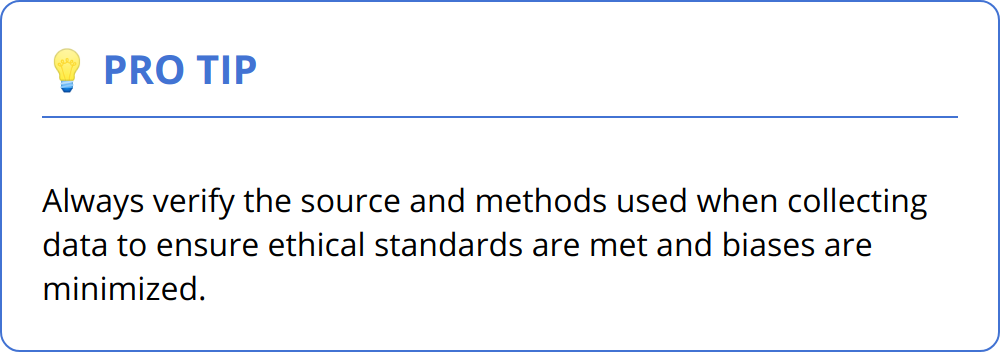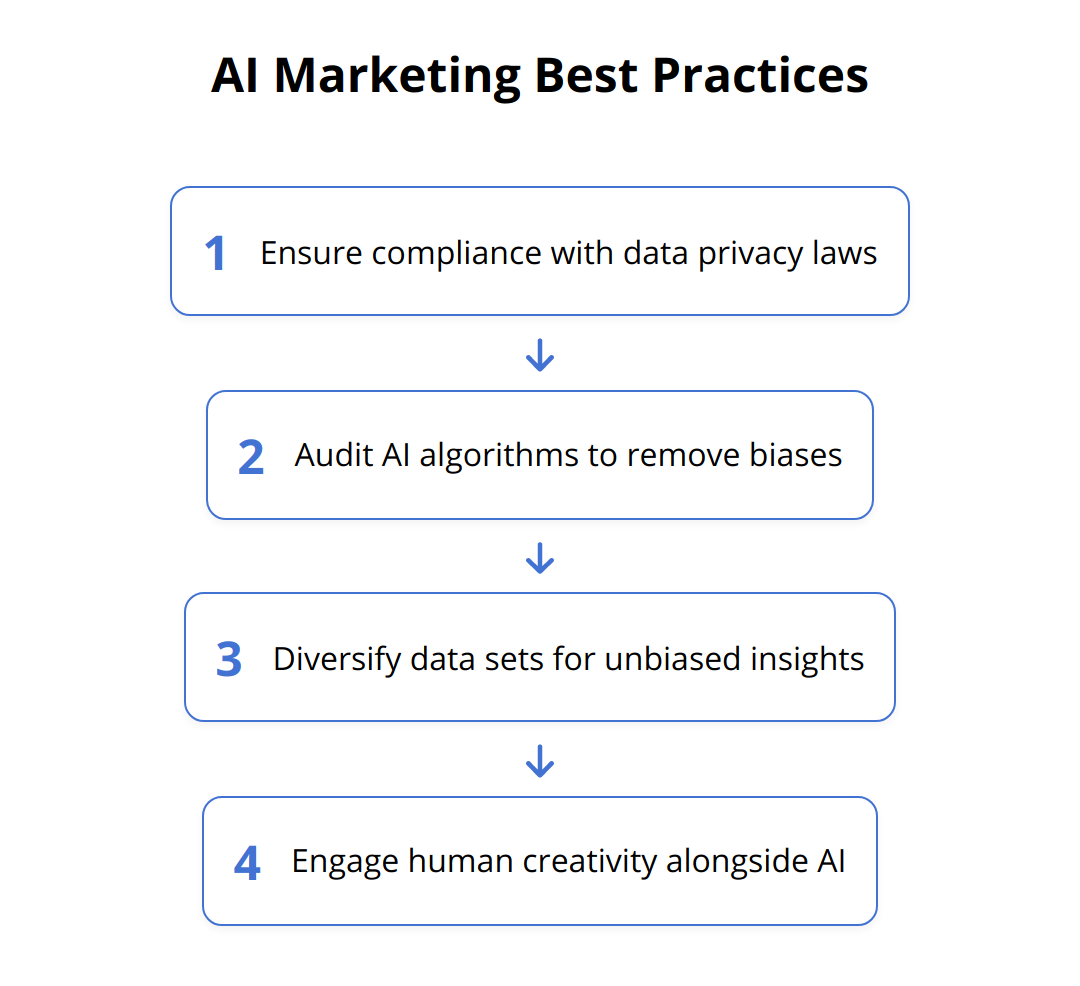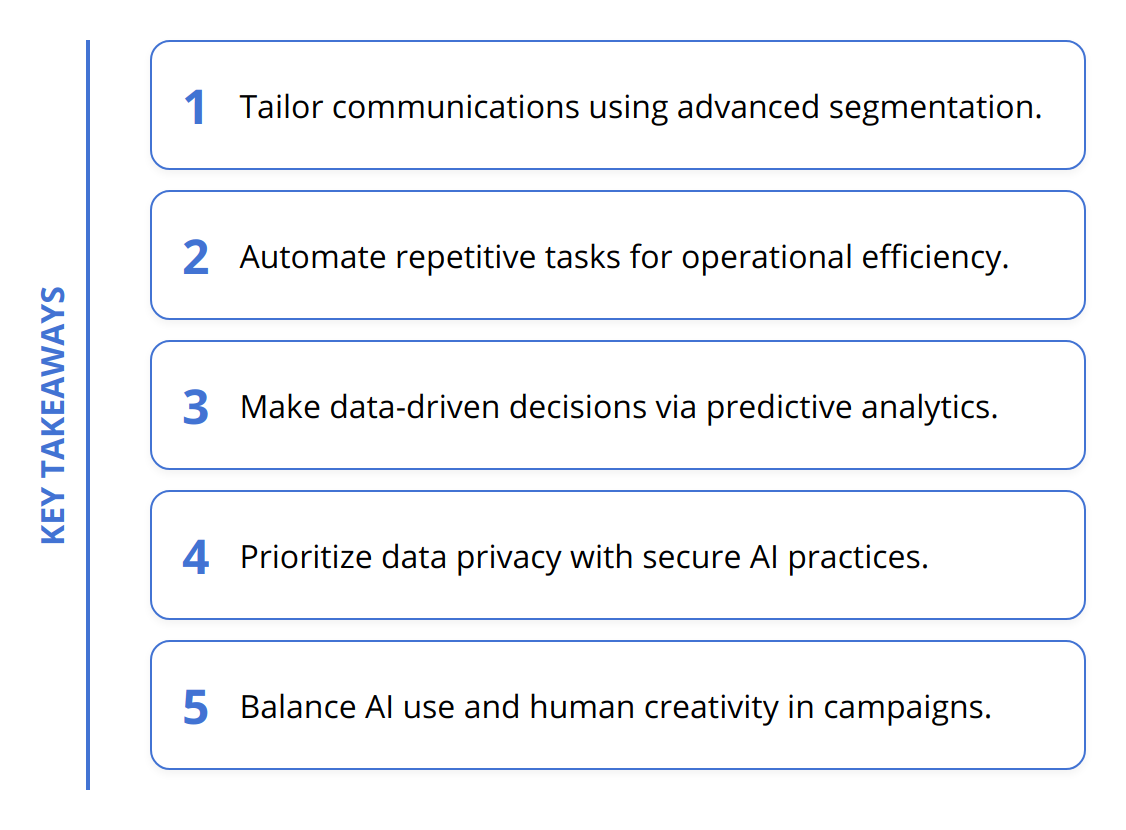Artificial Intelligence has significantly influenced the marketing landscape, bringing powerful tools to the forefront. We at Emplibot understand the nuanced blend of benefits and challenges AI introduces into this dynamic domain.
In this discussion, we weigh the advantages against the disadvantages, and explore how to strike an ideal balance between technology and human touch. Our insights aim to guide marketers through the evolving interface of AI, ensuring they are well-equipped for the future.
Personalization: Why Does It Matter in AI Marketing?
Artificial intelligence transforms marketing from a one-size-fits-all approach to hyper-personalized experiences that resonate with individual customers. Yet, making personalization effective requires marketers to harness the power of AI meticulously.
Take segmentation strategies, for instance. Advanced AI systems enable businesses to identify and group their audience with incredible precision. This doesn’t just entail basic demographic splits; AI digs deeper into behaviors, preferences, and purchase history to craft messages that hit home. For practical application, tools like Marketo or Mailchimp offer automated segmentation capabilities that marketers can leverage to tailor communications.

This statistic underscores the importance of personalization in driving conversions.
Efficiency is another aspect where AI shines. By automating repetitive tasks such as email campaigns, social media postings, and ad placements, marketers free up time to focus on strategic decision-making. Automation means faster execution and less human error, leading to a more seamless operation. Zapier, for example, automates workflows between different marketing tools without needing a single line of code.
Efficiency also extends to predictive analytics, a game-changer in understanding and anticipating consumer needs. With AI, marketers can predict trends, measure campaign performance, and adapt strategies in real-time—a vivid contrast to the slower, reactive approaches of the past.

Platforms like Google Analytics help track consumer behavior, providing valuable insights that shape future campaigns for effectiveness and higher ROI.
Here are direct advantages marketers can utilize with AI:
-
Tailored recommendations that reflect individual user behavior
-
Automated workflows that enhance campaign efficiency
-
Data analytics for more precise targeting strategies
AI’s marketing advances offer myriad benefits, but they must be balanced with thoughtful implementation and a human touch. Artificial intelligence in marketing pushes boundaries, but it’s the human marketers who set the course for its creative and ethical application. The journey ahead is packed with potential, as long as businesses remember that personalization, efficiency, and informed decision-making are not just the destination but the path itself.
Is AI Marketing Flawless?
While AI’s radiant shine in marketing is undeniable, it does cast some shadows. Marketers are grappling with not just the intricacies of AI applications but also its drawbacks. These obstacles can sometimes dampen the sparkle of AI-driven strategies, leading to pitfalls that require proactive management.
One significant challenge that draws concern is data privacy. As marketing solutions become increasingly data-driven, the potential for privacy breaches skyrockets. Marketers must navigate a minefield of regulations like GDPR, ensuring that customer information is safeguarded at every turn. Practical steps such as encrypted data storage and transparent data practices can help marketers maintain trust. For instance, employing tools like SecureWorks ensures that the data used for AI marketing complies with privacy laws.

Bias and inaccuracy in AI also present substantial hurdles. While AI can handle vast amounts of data, its output is only as good as the data input. Any existing biases in this data can lead to skewed marketing strategies that misrepresent or overlook certain demographics. To combat this, marketers need to continuously perform audits on their AI algorithms and diversify their data sets, reflecting a broader range of customer profiles. Addressing these biases is more than a technical fix; it’s a commitment to equitable marketing. Articles like Bias in Artificial Intelligence can provide further insight into these issues.
Another hiccup on the AI path is the risk of creativity loss. With AI taking on routine tasks, there’s a temptation to let it run all aspects of marketing. However, AI lacks the human capacity for out-of-the-box thinking and emotional connection. The art of crafting a story that tugs at heartstrings or the intuition that sparks a viral campaign—these are human gifts that AI can’t replicate. Marketers must strike a fine balance, allowing AI to handle the mundane while human creativity conjures the magic. It’s crucial to keep teams engaged in the creative process and not solely rely on algorithms to dictate all content.

To navigate the landscape of AI marketing effectively, remember to:
-
Prioritize the protection of customer data by utilizing secure AI tools and practices.
-
Regularly audit AI algorithms for biases, ensuring a fair representation of all customer segments.
-
Maintain a balance between AI efficiency and human creativity, with AI managing tasks and humans driving innovation.
This chapter acknowledges the dual-edged sword of AI in marketing—offering powerful advantages while introducing complex challenges. However, approaching these challenges proactively with practical solutions can help marketers wield this sword to their advantage, without cutting themselves on its blade.
The subsequent chapter will build upon these insights, delving into how marketers can integrate these considerations into a cohesive AI marketing strategy.
Balancing AI and Human Touch in Marketing
Marrying data-driven decisions with human instincts is vital in modern marketing. While AI offers precision and speed, it cannot truly understand human emotions or create a genuinely empathetic connection with your audience. Here’s how to strike the perfect balance for maximum impact.
Marketing success is heavily reliant on understanding the customer. Emotional intelligence, the ability to perceive and relate to emotions, is inherently a human trait. AI can predict behavior, but it can’t empathize. That’s why integrating human oversight into AI-driven strategies is more than smart—it’s essential.

The power of emotional storytelling can’t be overstated. AI assists by spotting trends and forecasting outcomes, but humans bring narratives to life. Successful campaigns often resonate on a deeper, emotional level, forging lasting connections with the audience. Marketers should use AI to gather insights but turn to their creativity and empathy to craft messages that truly engage.
Responsibly using customer data is non-negotiable. The rise in data breaches and privacy concerns has heightened consumer awareness and worry. Safe data handling isn’t just a technicality; it’s central to maintaining customer trust. Ensuring all AI applications are transparent and align with data protection regulations, such as using services like GDPR compliance tools, can breed confidence among users.
When implementing AI in your marketing mix, consider the following action points:
-
Let AI identify patterns and insights but reserve final decisions for team discussions. This fosters innovative thinking and prevents overreliance on automated outputs.
-
Audit your AI tools regularly. This isn’t just for checking functionality; it’s also to reaffirm that the brand’s ethical standards are being met.
-
Human input should guide content creation. Use tools to support your storytelling, not replace it.
Here’s a practical checklist to ensure your AI and human elements are working harmoniously:
-
Evaluate your AI tools: are they transparent in how they process and use data?
-
Involve your creative team in the data insights process: how can the numbers inform a richer brand narrative?
-
Offer employees regular training on new AI tools and data ethics, underscoring the importance of their roles within an AI-assisted marketing environment.
If AI is about optimizing and predicting, human input is about understanding and innovating. Remember that behind every piece of data is a person. Prioritize your human touch to turn those numbers into meaningful marketing wins. The journey is symbiotic—AI brings the might, but humans steer the insight.
AI Marketing: What’s Next?
As we march into the future, we see artificial intelligence becoming increasingly sophisticated in the realm of marketing. This progression prompts an inevitable evolution in how marketers use technology to engage with their audience. The following section looks ahead, highlighting key developments and providing guidance for marketers to prepare for the road ahead.
Harnessing Advanced AI for Deeper Insights
The next wave of AI brings with it an enhanced ability to understand and anticipate customer behavior. Marketers can expect AI to move beyond just recognizing patterns to actually predicting needs and crafting proactive solutions. Technologies utilizing machine learning will not only analyze past consumer behavior but also factor in real-time data, elevating the precision of marketing strategies.
For instance, AI is expected to improve its natural language understanding, enabling even more nuanced customer interactions. Marketers should stay informed about emerging AI tools that can refine customer communication, perhaps watching industry leaders like Salesforce Einstein for cutting-edge developments.
Actionable insights for marketers include:
-
Monitoring advancements in AI that offer real-time data processing
-
Being ready to adopt tools that improve upon existing customer interaction capabilities
Continuous Learning Curve for Marketers
As AI technologies evolve, so does the need for marketers to stay educated on both the capabilities and the limitations of these tools. It’s not enough to be aware of AI; marketers must grasp how to effectively integrate it into their strategies without compromising creativity or ethical considerations.
Marketers should consider participating in AI marketing workshops or certification programs, which can provide up-to-date training on the latest AI applications. Continuous education will be key in fully leveraging AI’s potential while respecting its boundaries.
Recommendations for staying ahead:
-
Invest in ongoing professional development focused on AI in marketing
-
Engage with peer groups and forums to exchange experiences and knowledge
Meeting Challenges Head-on
Regarding future obstacles, marketers may see increased concerns around AI’s role in accelerating the spread of misinformation. As AI gets better at creating content, there’s a risk of that content being used unethically. Therefore, it’s imperative that marketers commit to using AI responsibly, verifying the accuracy of generated content and using it to enhance, not deceive.
Another anticipated challenge lies in AI governance. As regulations evolve to keep pace with technology, marketers must remain vigilant, ensuring their AI practices comply with the latest laws and standards.
Businesses should prepare for these challenges by:
-
Setting in-house content verification standards for all AI-generated materials
-
Monitoring shifts in regulation and adapting their AI policies accordingly
This vision for AI in marketing isn’t about replacing the marketer’s role but enriching it with powerful technology while staying grounded in human judgment and ingenuity. Marketers’ adaptability and foresight will be instrumental in navigating the promises and pitfalls of AI in the coming years. Embracing this dual approach will be fundamental for those looking to thrive in the AI-augmented marketing landscape of tomorrow.
Wrapping Up
Artificial Intelligence has indelibly reshaped the terrain of marketing, offering unprecedented opportunities while simultaneously presenting new challenges. As we’ve explored throughout this blog post, the impact of AI on marketing is multifaceted, calling for a nuanced approach that seamlessly integrates technology with human creativity and empathy.

Marketers are now armed with AI-infused tools that afford deeper customer insights and personalization at scale. These advancements, however, come with the caveat of safeguarding customer data and ensuring the ethical use of technology. It’s clear that while AI can process and predict with remarkable accuracy, the unique human ability to connect emotionally and think creatively remains irreplaceable.
It is within this context that we at Emplibot emphasize the importance of a balanced strategy—one that leverages the strengths of AI to build effective marketing campaigns without losing sight of the human dimension that adds color and texture to the customer experience.
Summarizing the Impact of AI on Marketing
-
AI equips marketers with powerful personalization capabilities, making campaigns more relevant and effective.
-
Enhanced efficiency through the automation of marketing processes frees up time for creative endeavors.
-
Improved decision-making informed by analytics and predictive insights contributes to smarter marketing strategies.
Emphasizing the Need for a Balanced Approach
-
A mix of AI precision with human empathy and creativity cultivates marketing campaigns that resonate on a personal level.
-
Ethical considerations and transparent data practices are not optional but essential for trust and compliance.
Encouraging Informed and Strategic AI Adoption in Marketing Campaigns
-
Use AI as a tool for enhancement, not a replacement for the human element in marketing.
-
Stay ahead by continually educating your marketing team on AI trends, tools, and responsible usage.
In light of these considerations, harnessing AI in your marketing arsenal should be a strategic, informed choice. Rather than being swept away by the current of technological novelty, it’s vital for businesses to assess how AI can best serve their objectives and brand values. By doing so, marketers can run impactful campaigns that hit their mark effectively and ethically.
And for companies looking to maintain a robust online presence, Emplibot offers a solution that embodies this balance between technology and human oversight. Our service ensures your WordPress site is continually updated with SEO-friendly articles, complete with keyword research, images, and internal linking, all done automatically. Emplibot helps your business build a blog that not only engages and grows your audience but does so with efficiency and relevance at its core. Discover how Emplibot can streamline your content strategy and maintain your competitive edge in the fast-evolving digital landscape.
With AI continuing to develop at a rapid pace, the onus is on marketers to adapt, evolve, and above all, maintain the human touch that resonates with audiences. It is this synergy of man and machine that will define the successful marketing campaigns of the future.

